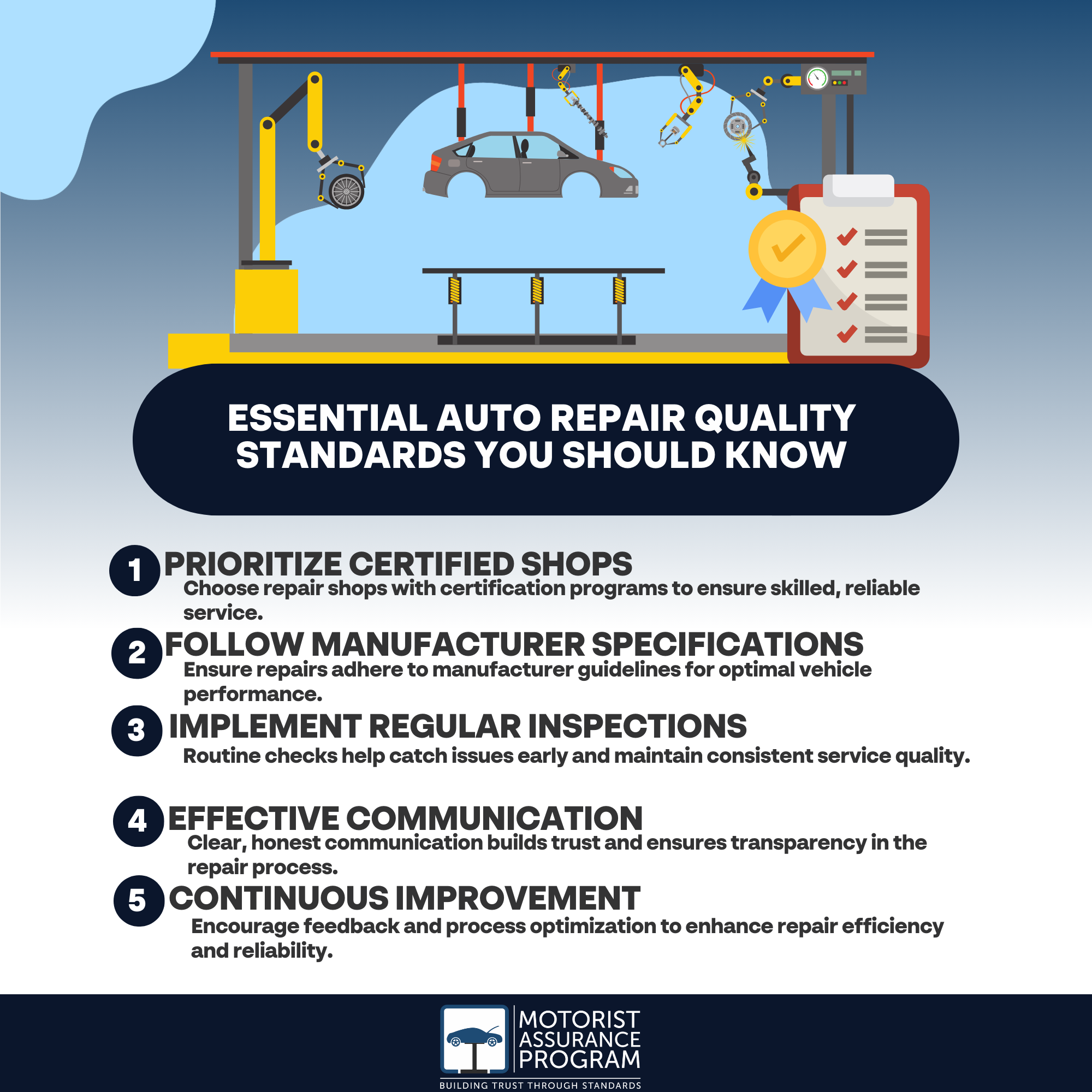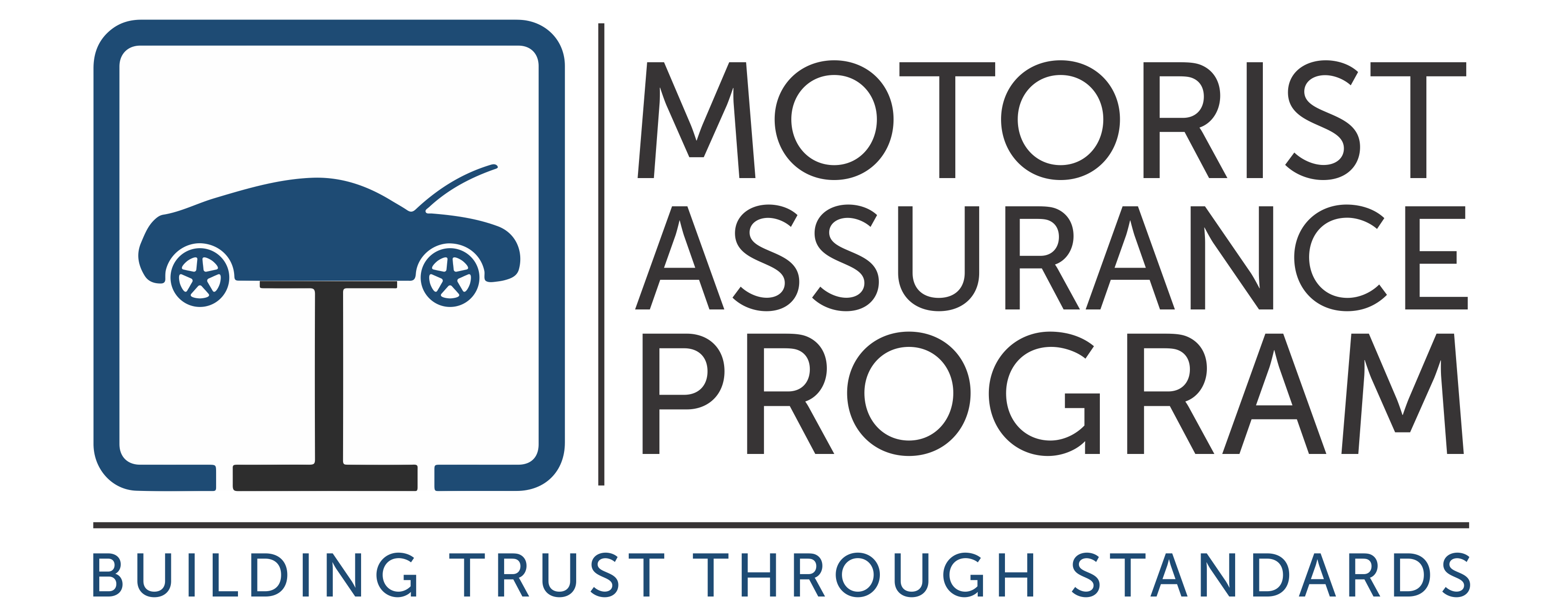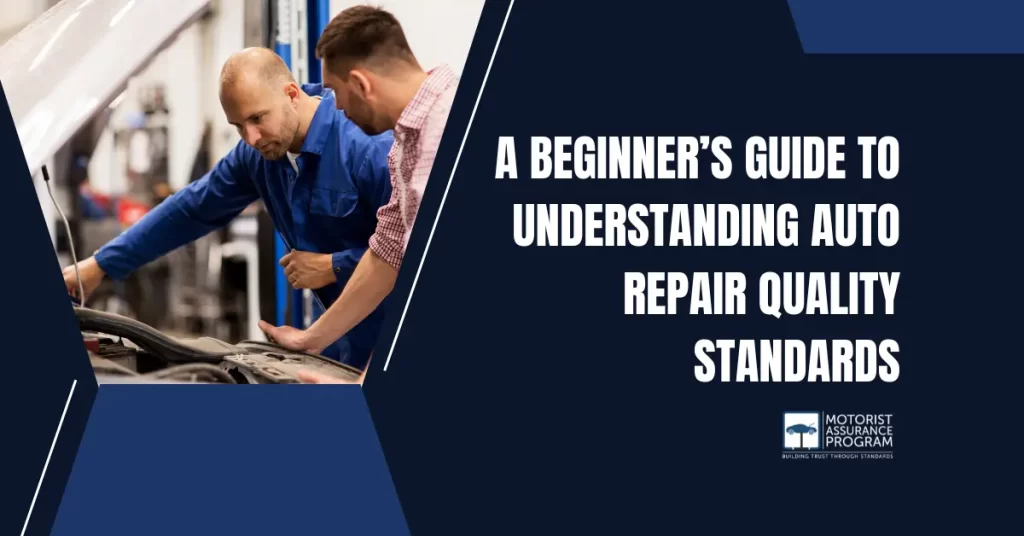A beginner’s guide to auto repair quality standards helps you navigate vehicle maintenance and guarantee safety. Quality standards are essential for reliable performance, particularly for electric and hybrid vehicles. By following established repair techniques and manufacturer specifications, you empower yourself to make informed decisions. Certification programs for repair shops enhance credibility and trust, while common quality control practices, like regular inspections, help catch issues early. Understand what to expect from repair services, including ethical practices and clear communication. Your journey doesn’t stop here—exploring the details can deepen your understanding and equip you for proactive vehicle care.

Key Takeaways
- Quality standards are crucial for safe vehicle operation and customer trust in auto repair services.
- Certification programs enhance repair shop credibility and ensure technicians are well-trained in current practices.
- Regular inspections and standardized techniques are essential for maintaining consistent service quality and identifying potential issues early.
- Effective communication with customers fosters trust, ensuring they understand repair processes and costs involved.
- Continuous improvement through feedback and process optimization helps enhance repair efficiency and service reliability.
Importance of Quality Standards
When it comes to auto repair, quality standards play a crucial role in guaranteeing your vehicle runs smoothly and safely. This is particularly important as the automotive landscape evolves with the rise of electric and hybrid vehicles, which require specialized knowledge and training.
You want to know that when you take your car in for service, it’s being handled with care and expertise. Electric vehicle maintenance reliability hinges on these standards, giving you peace of mind. When shops adhere to industry benchmarks, they build customer trust, knowing that consistent service means you can expect the same level of quality every time.
Safety compliance is non-negotiable; it guarantees your vehicle meets necessary regulations, keeping you and your passengers safe on the road. Technician training is critical, as skilled professionals are better equipped to handle repairs that meet high-quality expectations.
When technicians stay updated on performance metrics, they can diagnose issues accurately and efficiently. Warranty assurance also plays a part in this equation, guaranteeing any work done on your vehicle is protected.
With a commitment to service consistency and adherence to quality standards, you empower yourself as an informed car owner.
Overview of Quality Assurance
Quality assurance in auto repair is a systematic approach that guarantees services meet established standards and customer expectations. It’s all about ensuring that the work done on your vehicle aligns with quality benchmarks that have been set by the industry.
When you choose a repair shop that prioritizes quality assurance, you can expect a consistent level of service that enhances your vehicle’s performance and longevity.
Repair consistency is vital; it means that every time you bring your vehicle in for service, you’ll receive the same high standard of care. This consistency not only builds trust but also assures you that your vehicle is in capable hands.
By adhering to quality assurance practices, repair shops can identify potential issues early and address them before they escalate into costly problems.
Understanding quality assurance empowers you as a vehicle owner. You can ask the right questions and make informed decisions about where to take your car for repairs.
Key Standards in Auto Repair
Key standards in auto repair play a fundamental role in guaranteeing that your vehicle receives the best possible service. When you visit a shop, you want to know they adhere to key standards that reflect quality and reliability. These standards often include established repair techniques that align with industry benchmarks. By following these guidelines, technicians can ascertain that they’re using the most effective methods to diagnose and fix your vehicle’s issues.
One of the most significant aspects of these standards is the use of manufacturer specifications. Shops that follow these specifications demonstrate their commitment to quality. They not only fix issues but also prioritize safety and performance.
Quality control processes also help maintain consistency across the board, so you can trust that your vehicle will be in good hands.
Keeping up with advancements in tools and technology is another key element. This guarantees that technicians are equipped with the latest knowledge and equipment, enhancing their ability to deliver high-quality service.
Certification Programs for Shops
Certification programs for auto repair shops serve as a hallmark of quality and professionalism. When you choose a certified shop, you can trust that they’ve met rigorous standards set by industry experts.
These programs provide numerous certification benefits, including enhanced credibility and trustworthiness. A certified shop often has technicians who’ve undergone specialized training, ensuring they’re up to date with the latest technology and repair techniques.
Shop accreditation not only boosts a shop’s reputation but also reassures customers that they’re receiving reliable service. Many certification programs require shops to adhere to strict guidelines and undergo regular evaluations, which helps maintain high standards.
This commitment to excellence means you’re more likely to receive quality repairs and service.
Common Quality Control Practices
Guaranteeing excellence in auto repairs involves implementing common quality control practices that keep service reliable and efficient. One effective strategy is standardizing repair techniques across your team. By establishing clear protocols, you can guarantee that every technician follows the same steps, leading to improved service consistency.
Another key practice is conducting regular inspections of both the repair process and the finished work. These inspections help you identify any discrepancies or areas for improvement, guaranteeing that all repairs meet high standards.
Encourage open communication among your staff. When technicians share insights and feedback, it fosters a culture of continuous improvement and helps everyone stay aligned with quality expectations.
Don’t forget to keep detailed records of repairs and customer feedback. This data can highlight trends, allowing you to pinpoint recurring issues and train your team accordingly.
Also, consider ongoing education and training for your technicians. As repair techniques evolve, staying updated on the latest methods can enhance the quality of your services.
Implementing these common quality control practices not only boosts your reputation but also gives customers peace of mind, knowing their vehicles are in capable hands.
Understanding Customer Expectations
When you bring your vehicle in for repairs, understanding what you expect from the service is vital.
You’ll want to define quality criteria, guarantee transparency throughout the process, and communicate effectively with your technician.
Defining Service Quality Criteria
Service quality criteria play an important role in shaping customer satisfaction in the auto repair industry. When you visit a repair shop, you expect service consistency and repair durability. These criteria guarantee that you receive reliable and long-lasting results every time you bring your vehicle in.
To meet your expectations, a shop should have trained technicians who follow established procedures. This consistency helps you trust that each repair will be performed to the same high standard.
Repair durability is vital; you want your car to perform well long after the service is completed. Knowing that the parts used are quality certified and the work done is reliable gives you peace of mind.
A clear understanding of these service quality criteria empowers you as a customer. You can ask informed questions and better evaluate the services being offered.
Remember, your vehicle is an investment, and making sure you receive exceptional service is key to maintaining its value.
By recognizing these standards, you can make smarter choices, ensuring your auto repair experience is both satisfying and worthwhile.
Importance of Transparency
Transparency in the auto repair process builds trust between customers and repair shops. When you know what’s happening with your vehicle, it eases your mind and strengthens your relationship with the mechanic.
Trust building is crucial in this industry, as it directly impacts customer satisfaction and loyalty. You’ll feel more confident when you understand the work being done, the costs involved, and the timeline for repairs.
Repair ethics play a significant role in this transparency. Ethical repair shops prioritize honesty, ensuring you receive fair estimates and detailed explanations about necessary repairs.
They won’t push unnecessary services just to increase their profits. Instead, they’ll guide you through your options, empowering you to make informed decisions about your vehicle.
Effective Communication Strategies
How can auto repair shops truly meet customer expectations? The key lies in effective communication strategies. Practicing active listening is crucial. When you engage with customers, make certain you’re genuinely hearing their concerns and questions. This not only builds trust but also helps you understand their needs better.
Establishing feedback loops is another essential component. After discussing the repairs needed, check in with your customers. Ask if they’ve any questions or if there’s anything else they want to address. This ongoing dialogue guarantees they feel valued and informed throughout the process.
Clarity in your explanations can greatly boost customer satisfaction. When you break down technical information into easy-to-understand terms, it empowers your customers, making them feel involved in their vehicle’s care.
Lastly, always encourage open communication. Let your customers know they can reach out anytime with questions or concerns. In the end, effective communication isn’t just about words; it’s about building trust and loyalty in your auto repair business.
Role of Inspections in Repairs
Conducting thorough inspections is essential to ensuring quality auto repairs. By understanding different inspection types, you can better assess your vehicle’s needs. Routine checks like visual inspections and diagnostic scans help identify issues early, while specialized inspections can uncover hidden problems.
The frequency of these inspections is crucial; regular evaluations can save you money and time down the road. Utilizing the right inspection tools, such as OBD-II scanners and tire pressure gauges, makes the process more effective.
Inspection checklists streamline your approach, ensuring no detail is overlooked. Following established inspection standards boosts confidence in the repair process, leading to safer vehicles.
The benefits of inspections are clear: they enhance safety, prolong vehicle life, and improve overall performance. You’ll also appreciate the thorough inspection documentation, which provides valuable records of your vehicle’s history and helps track maintenance schedules.
Continuous Improvement Strategies
Continuous improvement strategies are essential for maintaining high-quality auto repair standards. By adopting lean methodologies, you can streamline your operations and eliminate waste, allowing you to focus on what truly matters: providing exceptional service to your customers.
Start by analyzing your current processes; look for areas where you can enhance efficiency and reduce unnecessary steps.
Process optimization is a key aspect of this journey. By refining your workflows, you’ll not only save time but also improve the consistency and reliability of your repairs.
Implementing regular feedback loops will help you identify problems early, ensuring that your team continually learns and adapts.
Encourage a culture of open communication, where employees feel comfortable sharing ideas for improvement. This collective effort can lead to innovative solutions that drive your shop forward.
Frequently Asked Questions
What Tools Are Essential for Maintaining Auto Repair Quality Standards?
To maintain auto repair quality standards, you need basic repair tools like wrenches and screwdrivers, along with diagnostic equipment such as scanners and multimeters. These essentials help you guarantee accurate assessments and effective repairs.
How Can I Identify a Quality Auto Repair Shop?
Finding a quality auto repair shop isn’t always easy. Check customer reviews and look for shop certifications. Trustworthy mechanics will prioritize transparency and communication, ensuring your vehicle gets the care it deserves.
What Are the Signs of Poor Repair Quality?
To spot poor repair quality, look for repair indicators like uneven gaps, misaligned parts, or paint inconsistencies. Use inspection tips such as checking for unusual noises and testing all functions after repairs to guarantee everything’s working correctly.
How Often Should I Get My Vehicle Inspected for Quality Assurance?
Think of your vehicle as a trusty steed. To guarantee it gallops smoothly, you should schedule inspections every six months. This inspection frequency keeps your ride in top shape, making vehicle maintenance a breeze.
Are There Warranties on Repairs Related to Quality Standards?
Yes, there are warranties on repairs. Different repair warranty types offer varying coverage. However, keep in mind that warranty coverage limitations may apply, so always check the specifics before proceeding with any repairs.
Conclusion
In conclusion, understanding auto repair quality standards isn’t just beneficial; it’s essential for ensuring your vehicle’s longevity and safety. By prioritizing quality in auto repairs, you’re not only protecting your investment but also enhancing your driving experience. Stay informed, and take charge of your vehicle’s maintenance!


